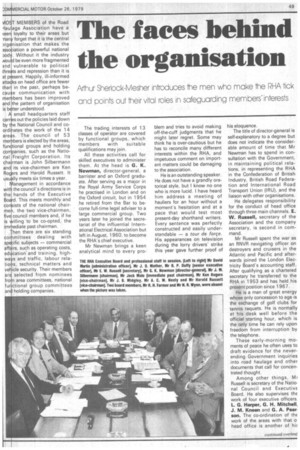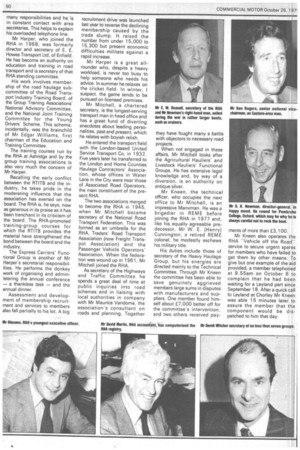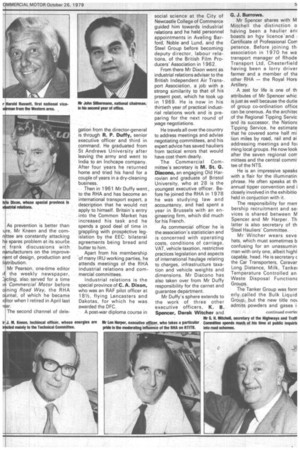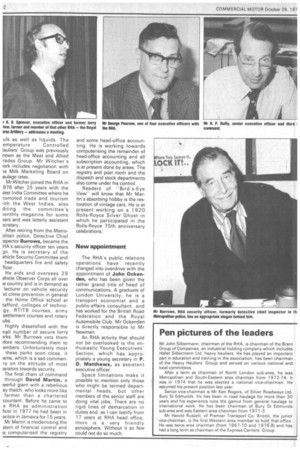The faces behind the organisation
Page 51

Page 52

Page 53

Page 54

If you've noticed an error in this article please click here to report it so we can fix it.
A ur Sherlock-1Vesher introduces the men who make e RHA tick and points out eir vital roles In safeguarding members-interests V10 T MEMBERS of the Road -.tau age Association have a (ee loyalty to their areas but -nan forget that it is the central rg.nisation that makes the 3sso iation a powerful national pod . Without it the industry NOU d be even more fragmented 3 n d vulnerable to political thre ts and repression than it is
p sent. Happily, ill-informed attai ks on head office are fewer tha in the past, perhaps becau e communication with meMbers has been improved and the pattern of organisation is better understood.
small headquarters staff carries out the policies laid down by the National Council and coordinates the work of the 14 are s. The council of 53 niertibers is elected by the areas, fun tional groups and holding corijpanies, such as the National Freight Corporation. Its cha rman is John Silbermann andj its vice-chairmen are Ken Ro ers and Harold Russett. It usu Ily meets six times a year.
anagement in accordance witli the council's directions is in the: hands of the Executive Board. This meets monthly and co ists of the national chairme , the two vice-chairmen, five council members and, if he is willing to be co-opted, the im ediate past chairman.
hen there are six standing co mittees dealing with sp fic subjects — commercial aff irs, such as operating costs, ed cation' and training, highwa s and traffic, labour relatio s, technical matters and ve icle security. Their members ar selected from nominees fro area committees, national fu ctional group committees anu holding companies. The trading interests of 13 classes of operator are covered by functional groups, which members with suitable qualifications may join.
All these activities call for skilled executives to administer them. At the head is G. K. Newman, director-general, a barrister and an Oxford graduate. After serving as a major in the Royal Army Service Corps he practised in London and on the Oxford circuit, but in 1954 he retired from the Bar to become full-time legal adviser to a large commercial group. Two years later he joined the secretariat of the influential International Electrical Association but left in August, 1960, to become the RHA's chief executive.
Mr Newman brings a keen analytical mind to every pro-' blem and tries to avoid making off-the-cuff judgments that he might later regret. Some may think he is over-cautious but he has to reconcile many different interests within the RHA, and impetuous comment on important matters could be damaging to the association.
He is an outstanding speaker. He does not have a grandly oratorical style, but I know no one who is more lucid. I have heard him address a meeting of hauliers for an hour without a moment's hesitation and at a pace that would test most present-day shorthand writers. Every sentence was perfectly constructed and easily understandable — a tour de force. His appearances on television during the lorry drivers' strike this year gave further proof of
his eloquence.
The title of director-general is self-explanatory to a degree but does not indicate the considerable amount of time that Mr Newman has to spend in consultation with the Government, in maintaining political relations, in representing the RHA in the Confederation of British Industry, British Road Federation and International Road Transport Union (IRU), and the liaison with other organisations.
He delegates responsibility for the conduct of head office through three main channels. E. W. Russell, secretary of the Association and the company secretary, is second in command.
Mr Russell spent the war as an RNVR navigating officer on destroyers and cruisers in the Atlantic and Pacific and afterwards joined the London Electricity Board's accounting staff. After qualifying as a chartered secretary he transferred to the RHA in 1953 and has held his present position since 1967.
He is a man of great energy whose only concession to age is the exchange of golf clubs for tennis raquets. He is normally at his desk well before the official starting hour, which is the only time he can rely upon freedom from interruption by the telephone.
These early-morning moments of peke he often uses to draft evidence for the neverending Government inquiries into road haulage and other documents that call for concentrated thought.
Among other things, Mi Russell is secretary of the National Council and Executive Board. He also supervises the work of four executive officers, L. G. Harper, G. H. Mitchell, J. M. Kneen and G. A. Pear. son. The co-ordination of thE work of the areas with that ohead office is another of hi
many responsibilities and he 'is in constant contact with area secretaries. This helps to explain his overloaded telephone line.
Mr Harper, who joined the RHA in 1968, was formerly director and secretary of E. E. Howes Transport Ltd, of Enfield. He has become an authority on education and training in road transport and is secretary of that RHA standing committee.
His work involves membership of the road haulage subcommittee of the Road Transport Industry Training Board, of the Group Training Associations' National Advisory Committee, and the National Joint Training Committee for the Young Drivers' Scheme. This scheme, incidentally, was the brainchild of Mr Edgar Williams, first chairman of the Education and Training Committee.
The training courses run by the RHA at Ashridge and by the group training associations is also very much the concern of Mr Harper.
Recalling the early conflict between the RTITB and the industry, he takes pride in the moderating influence that the association has exerted on the board. The RHA is, he says, now as generous in its praise as it has been trenchant in its criticism of the board. The RHA-promoted training-group courses for which the RTITB provides the material have strengthened the bond between the board and the industry.
The Express Carriers' Functional Group is another of Mr Harper's secretarial responsibilities. He performs the donkey work of organising and administering the annual conference' — a thankless task — and the annual dinner.
Assessment and development of membership recruitment and services to members also fall partially to his lot. A big recruitment drive was launched last year to reverse the declining membership caused by the trade slump. It raised the number from under 15,000 to 15,300 but present economic difficulties militate against a rapid increase.
Mr Harper is a great allrounder who, despite a heavy workload, is never too busy to help someone who needs his advice. In summer he relaxes on the cricket field. In winter, I suspect, the game tends to be pursued on licensed premises.
Mr Mitchell, a chartered secretary, is the longest-serving transport man in head office and has a great fund of diverting anecdotes about leading personalities, past and present, which he relates with boyish relish.
He entered the transport field with the London-based United Service Transport Co, in 1932. Five years later he transferred to the London and Home Counties Haulage Contractors' Association, whose offices in Water Lane in the City were near those of Associated Road Operators, the main constituent of the present RHA.
The two associations merged to become the RHA in 1945, when Mr Mitchell became secretary of the National Road Transport Federation. This was formed as an umbrella for the RHA, Traders' Road Transport Association (now Freight Transpot Association) and the Passenger Vehicle Operators' Association. When the federation was wound up in 1961, Mr Mitchell joined the RHA.
As secretary of the Highways and Traffic Committee he spends a great deal of time at public inquiries into road schemes and in liaising with local authorities in company with Mr Maurice Vandome, the association's consultant on roads and planning. Together they have fought many a battle with objectors to necessary road projects.
When not engaged in these affairs, Mr Mitchell looks after the Agricultural Hauliers' and Livestock Hauliers' Functional Groups. He has extensive legal knowledge and, by way of a diversion, is an authority on antique silver.
Mr Kneen, the technical officer, who occupies the next office to Mr Mitchell, is an impressive Manxman. He was a brigadier in REM E before joining the RHA in 1977 and, like his equally agreeable predecessor, Mr W. E. (Henry) Cunnington, a retired REME colonel, he modestly eschews his military title.
His duties include those of secretary of the Heavy Haulage Group, but his energies are directed mainly to the Technical Committee. Through Mr Kneen the committee has been able to save genuinely aggrieved members large sums in disputes with manufacturers and suppliers. One member found himself about £7,000 better off for the committee's intervention, and two others received pay ments of more than £3,100 Mr Kneen also operates the RHA "Vehicle off the Road" service to secure urgent spares for members who have failed to get them by other means. To give but one example of the aid provided, a member telephoned at 9.55am on October 8 to complain that he had been waiting for a Leyland part since September 18. After a quick call to Leyland at Chorley Mr Kneen was able 15 minutes later to assure the member that the component would be dispatched to him that day. As prevention is better than re, Mr Kneen and the cornn ttee are constantly attacking h spares problem at its sourhe frank discussions with ii nufacturers on the improvent of design, production and Ii tribution.
Mr Pearson, one-time editor the weekly newspaper, cling, also served for a time WI Commercial Motor before oining Road Way, the RHA o'urnal, of which he became dtor when I retired in April last rear.
The second channel of ciele gation from the.director-general is through R. P. Duffy, senior executive officer and third in command. He graduated from St Andrews University after leaving the army and went to India to an lnchcape company. After four years he returned home and tried his hand for a couple of years in a dry-cleaning business.
Then in 1961 Mr Duffy went, to the RHA and has become an international transport expert, p description that he would not• apply to himself. Britain's entry into the Common Market has increased his task and he spends a good deal of time in grappling with prospective legislation by the EEC: bilateral agreements being bread and butter to him.
Apart from his membership of many IRU working parties, he attends meetings of the RHA industrial relations and commercial committees.
Industrial relations is the special province of C. A. Dixon, who was an RAF pilot officer at 181/2, flying Lancasters and Dakotas, for which he was awarded the DFC.
A post-war diploma course in social science at the City of Newcastle College of Commerce guided him towards industrial relations and he held personnel appointments in Aveling Barford, Noble and Lund, and the Steel Group before becoming deputy director, labour relations, of the British Film Producers' Association in 1962.
From there Mr Dixon went as industrial relations adviser to the British Independent Air Transport Association, a job with a strong similarity to that of his present post, which he took up in 1969. He is now in his thirtieth year of practical industrial relations work and is preparing for the next round of wage negotiations.
He travels all over the country to address meetings and advise negotiating committees, and his expert advice has saved hauliers from tactical errors that would have cost them dearly.
The Commercial Committee's secretary is M. St. G. Diacono, an engaging Old Harrovian and graduate of Bristol University, who at 28 is the youngest executive officer. Before he joined the RHA in 1978 he was studying law and accountancy, and had spent a year in Brussels with an engineering firm, which did much for his French.
As commercial officer he is the association's statistician and is concerned with operating costs, conditions of carriage, VAT, vehicle taxation, restrictive practices legislation and aspects of international haulage relating to charges, infrastructure taxation and vehicle weights and dimensions. Mr Diacono has also taken over from Mr Duffy responsibility for the carnet and guarantee department.
Mr Duffy's sphere extends to the work of three other executive officers, K. B. Spencer, Derek Witcher and Mr G. H. Mitchell, secretary of the Highways and Traffi Committee spends much of his lime at public inquirit into road schemes. The Tanker Group was forrr erly called the Bulk Liquid Group, but the new title no admits powders and gases i continued overlet G. J. Burrows.
Mr Spencer shares with M Mitchell the distinction o having been a haulier an boasts an hgv licence and ; Certificate of Professional Corn petence. Before joining th, association in 1970 he wa transport manager of Rhode Transport Ltd, Chesterfield having been a lorry driver farmer and a member of tha other RHA — the Royal Hors. Artillery.
A zest for life is one of th attributes of Mr Spencer whic is just as well because the dutie of group co-ordination office can be onerous. As the architec of the Regional Tipping Servic and its successor, the NationE Tipping Service, he estimate that he covered some half rni lion miles by road, rail and ai addressing meetings and fol ming local groups. He now look after the seven regional corr mittees and the central commi. tee of the NTS.
He is an impressive speake with a flair for the illuminatin. phrase. He often speaks at th annual tipper convention and i closely involved in the exhibitio held in conjuction with it.
The responsibility for men' bership recruitment and sei vices is shared between M Spencer and Mr Harper. Th latter is also secretary of th 'Steel Hauliers' Committee.
Mr Witcher wears seve hats, which must sometimes b confusing for an unassumin man with only one, albeit highl capable, head. He is secretary c the Car Transporters, Caravar Long Distance, Milk, Tanker Temperature Controlled an Waste Disposal FunctionE Groups.
The Tanker Group was forrr erly called the Bulk Liquid Group, but the new title no admits powders and gases i ulk as well as liquids. The emperature Controlled lauliers' Group was previously nown as the Meat and Allied rades Group. Mr Witcher's tork includes negotiation with le Milk Marketing Board on aulage rates.
Mr Witcher joined the RHA in 976 after 25 years with the lest India Committee where he romoted trade and tourism iith the West Indies, also diting the committee's lonthly magazine for some aars and was latterly assistant icretary.
After retiring from the Metroolitan police, Detective Chief ispector Burrows, became the HA's security officer ten years go. He is secretary of the ehicle Security Committee and headquarters fire and safety He aids and oversees 29 ehicle Observer Corps all over le country and is in demand as lecturer on vehicle security id crime prevention in general the Horne Office school at tafford, colleges of techno.gy, RTITB courses, army settlement courses and rotary ubs.
Highly dissatisfied with the nall number of secure lorry irks, Mr Burrows vets them ifore recommending them to embers. Unfortunately most these parks soon close, it ems, which is a sad commen ry on the attitude of most ierators towards security.
The final chain of command through David Martin, a ieerful giant with a rebellious ey thatch, who looks more like farmer than a chartered :countant. Before he came to e RHA as administration ficer in 1977 he had been in actice in Jamaica for 15 years. Mr Martin is modernising The stem of financial control and is computerised the registry and some head-office accounting. He is working towards computerising the remainder of head-office accounting and all subscription accounting, which is at present done by areas. The registry and post room and the dispatch and stock departments also come under his control.
Readers of "Bird's-Eye. View" will know that Mr Martin's absorbing hobby is the restoration of vintage cars. He is at present working on a 1920 Rolls-Royce Silver Ghost in which he participated in the Rolls-Royce 75th anniversary celebrations.
New appointment
The RHA's public relations operations have recently changed into overdrive with the appointment of John Ockenden, who has been given the 'rather grand title of head of communications. A graduate of London University, he is a transport economist and a public-affairs consultant, and has worked for the British Road Federation and the Royal Automobile Club. Mr Ockenden is directly responsible to Mr Newman.
An RHA activity that should not be overlooked is the enthusiastic Young Executives' Section, which has appropriately a young secretary in P. D. Matthews, as assistant executive officer.
Space limitations make it possible to mention only those who might be termed departmental heads, but other ,members of the senior staff are doing vital jobs. There are no rigid lines of demarcation in duties and, as I can testify from 17 years at RHA head office, there is a very friendly atmosphere. Without it so few could not do so much.
























































































































